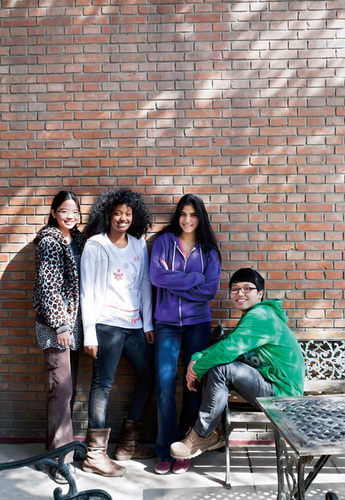 According to National Geographic, there were only 5 million people in total in 8000 BC – roughly the population of modern-day Papua New Guinea. As of 2012, the world population is estimated to have surpassed 7 billion people. This population explosion has created a litany of environmental problems: air pollution, ozone damage, deforestation, damming, and more. beijingkids sat down with four students from Beijing BISS International School to talk about the challenges that future generations face when it comes to overpopulation.
According to National Geographic, there were only 5 million people in total in 8000 BC – roughly the population of modern-day Papua New Guinea. As of 2012, the world population is estimated to have surpassed 7 billion people. This population explosion has created a litany of environmental problems: air pollution, ozone damage, deforestation, damming, and more. beijingkids sat down with four students from Beijing BISS International School to talk about the challenges that future generations face when it comes to overpopulation.
From left:
Eileen Yeo, 16, Singapore, has been living in Beijing for four years
Zekre Mesfin, 14, Ethiopia, has been living in Beijing for seven months
Anna-Catharina Fonseka, 16, Germany/Seychelles, has been living in Beijing for over a year
Jun Su Jang, 18, South Korea, has been living in Beijing for seven years
What spring to mind when you hear the word “overpopulation”?
Eileen: A lot of people.
Anna-Catharina: Crammed places.
Jun Su: China. It [also]reminds me of cars and air pollution.
Zekre: It reminds me that we don’t have the resources to take care of that many people.
What are the major causes of overpopulation?
Jun Su: One would be illiteracy. People are not educated about the consequences of having too many babies and unprotected sex.
Eileen: In other countries, it’s also a kind of family ritual. For example, in China, most parents want you to get married and build a family.
Anna-Catharina: They want to carry on their name and traditions through the generations.
Eileen: Also, some religions don’t allow abortion.
Who does overpopulation affect the most?
Eileen: Poor people, because they don’t have the financial support to raise that many children and to buy a house that’s big enough, [as well as]education.
Zekre: Some people in Ethiopia can’t afford to [sustain]themselves, let alone a child. So when the child is born, [s/he] often dies of starvation. It’s a big problem when people can’t afford [to]have babies, but do it anyway.
Jun Su: It affects a broad range of people, from students to workers to older people. First, we have the environmental problems that are caused by overpopulation. Second, there is more competition for competent people. Personally, I don’t like competing with other people – but we have to.
Anna-Catharina: [Overpopulation] affects the environment a lot. My dad told me that, 30 years ago, Beijing was extremely different.
How big of a threat is overpopulation to the planet?
Eileen: Quite big.
Anna-Catharina: There are a lot of people, but it’s the fact that they’re not spread around [that’s the problem]. There are still places in the world where it’s not populated, because it’s just not suitable to live there.
Jun Su: I actually heard this statistic that we can fit the entire world population in [an area the size of]Mexico and still let everyone live. So I understand what Anna is saying; overpopulation in one specific area can be very threatening.
Is overpopulation a problem where you come from?
Eileen: No, they actually encourage people to have more babies in Singapore. If you have more than one, the school fees go down.
Anna-Catharina: In Germany, not really. But Seychelles is smaller than Chaoyang District – we’ve got 80,000 people living there, which is like the Bird’s Nest. Many young people have unprotected sex because they’re not well-educated, so [the Seychellois government]encourages sex education.
Jun Su: In South Korea, if you have three babies, every child [from the third one onwards]gets free education. We have many old people and very few adolescents (and future leaders). So the government supports [increasing the]population for a new generation.
Zekre: Sixty or seventy years ago in Ethiopia, it was OK for very young kids – like girls of 12 – to get married off to older men and then have babies at the age of 13. That may have contributed [to overpopulation,]because they would have kids at a very young age, sometimes up to ten.
What can people do to address overpopulation?
Anna-Catharina: You can’t stop people from having babies, because it’s their choice. You can only educate them.
Jun Su: If the one-child policy was imposed on me, I wouldn’t like it because I actually want to have four kids. In China, what tends to happen is that rich people just pay the tax for the second or third child. In that case, government policies are not that effective.
Eileen: If you have the ability, you can get a job with the government where you can find a way to solve overpopulation.
Anna-Catharina: A lot of people talk about it, but then they end up not doing anything individually.
Zekre: I would consider adoption. With all the children out there who don’t have any families because their parents either died or didn’t want them, I don’t think making more is that helpful.
What implications does overpopulation have for the future?
Jun Su: We’re going to run out of natural resources like fossil fuels and natural gas.
Anna-Catharina: Overpopulation also means more people are going to harm the environment, which is already happening now.
Zekre: People are saying that we’re going to run out of natural resources in 50 years at the pace we’re going at. If there’s [a larger]population, what’s going to happen to us?
Eileen: But on the other hand, it could encourage governments to find other planets. [Laughs]
This article is excerpted from beijingkids April 2012 issue. View it in PDF form here or contact distribution@beijing-kids.com to find out where you can pick up your free copy.



